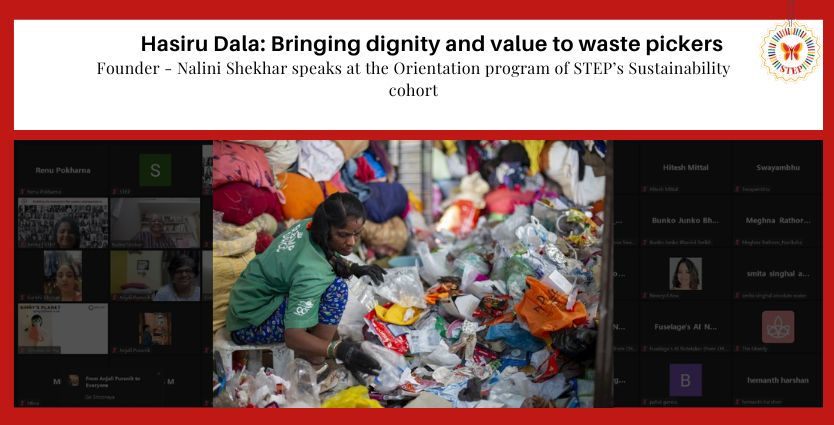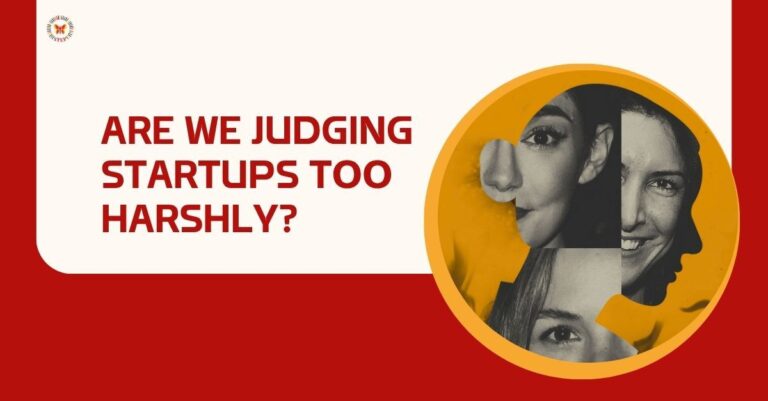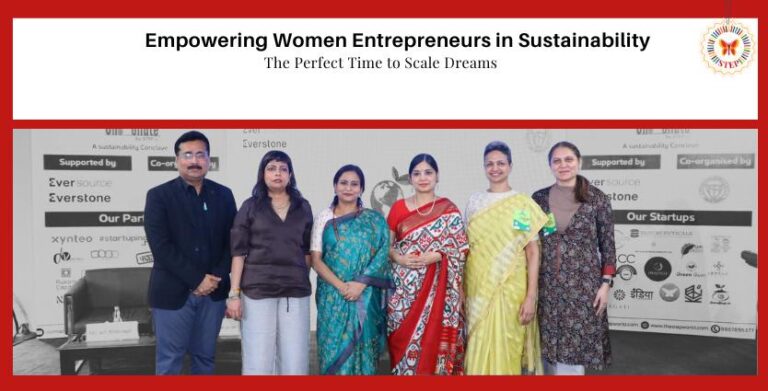Hasirudala: Bringing dignity to wastepickers
( Following is an excerpt of Ms. Nalini Shekhar’s inspiring speech at the orientation program of STEP’s sustainability cohort. Nalini Shekar is the co-founder and Executive Director of Hasiru Dala, a social impact organisation working with waste pickers and other waste workers to ensure a life with dignity.)
Indumathi’s Journey: From Waste Picker to Award-Winning Entrepreneur
A few years ago, Indumathi walked the streets of Bengaluru with a heavy sack on her shoulder, tirelessly collecting recyclable waste. Her work was gruelling, filled with countless bends and stretches, yet she earned just enough to keep her family going. Her children couldn’t go to school because she couldn’t afford it, and even putting a single meal on the table was a struggle. Some days, she had to borrow food meant for cattle to feed her family.
When Hasirudala first met Indumathi about a decade ago, they offered her a scholarship for her children’s education. She didn’t hesitate to accept, and despite her challenging circumstances, she ensured her children went to school. Today, Indumathi is a different person. She’s been recognized with the Namma Bengaluru Award for Social Entrepreneurship and now runs her own company.
“ Indumathi has 88 people working under her, though she still insists on collecting waste herself. She doesn’t read and write, but all her transactions for her workers’ payments are online, and she knows how to manage her money very well,” says Nalini.
Indumathi’s story is just one example of the impact Hasirudala has made.
And today, waste pickers from different parts of Karnataka where Hasirudala doesn’t work, ask Hasirudala if they can work with the organisation.
That is the change that has happened in ten years in the lives of waste pickers.
Hasirudala also played a key role in making Bengaluru the first city in India to sign a MOU between waste pickers and the local government, formalising their essential role in managing the city’s waste.
“ We just created a platform for them to move forward and become entrepreneurs,” says Nalini.
Taking on Bengaluru’s Waste Crisis
Back in 2011-12, Bengaluru faced a major waste crisis. Landfills were overflowing, and the communities living near them had had enough. The city was overwhelmed by the smell of unprocessed waste, and something needed to change. Hasirudala, still a young organisation at the time, stepped up.
It wasn’t easy initially. Waste pickers were cautious as promises had let them down never kept, and trusting another organisation wasn’t easy. But sometimes, all it takes is one person to start a movement.
For Hasirudala, that person was Annamma, a waste picker who decided to give them a chance. Her courage encouraged others to join, and soon, a network of waste pickers began to form across Karnataka, united by a shared hope for a better future.
“We had just begun working with waste pickers and I told them to put on gloves and shoes and just start picking up waste. And then we started pulling out only recyclable or inorganic waste from that pile,’ says Shekhar.
In just two days, they pulled out 10 tons of recyclable material, showing everyone what was possible with organised waste management.
Hasirudala approached the local government with a simple question: Why send all this waste to landfills when so much of it can be recycled? They proposed creating a dry waste collection center in each ward, which could drastically reduce the amount of waste heading to landfills. The government agreed, and soon, they had one or two buildings allocated for this purpose.
Hasirudala initially planned scrap dealers or the retail market could manage the dry waste collection centers. But the waste pickers spoke up, saying they wanted to run this. Hasirudala partnered with Jain College to start a session and certificate course specifically for them. Since the waste pickers couldn’t read or write they introduced a lot of hands-on, experiential learning.
Today, 87 entrepreneurs have emerged from this effort, with 42% of them being women.
Innovating for a Sustainable Future
Hasirudala has transformed waste management in Bengaluru by tackling inefficiencies and bringing clarity to a system previously plagued by double payments and poor service. In the early days, contractors were collecting waste from apartments and charging both the government and private entities for the same work. Seeing an opportunity for change, Hasirudala proposed managing waste collection for bulk waste generators, and integrating waste pickers into the process. This led to the development of a unique model where waste pickers became entrepreneurs, responsible for collecting and sorting dry waste. “We were operating in uncharted territory,” says Shekar, “But we knew we could make it work with the city, the waste pickers, and the citizens on our side.”
As Hasirudala’s work grew, so did their innovations. They established Hasiru Dala Innovations, a company that now services over 40,000 households in Bengaluru.
Today, Hasirudala Innovations services over 40,000 households, adhering to the “polluter pays” principle, meaning waste isn’t collected unless properly segregated. The organisation has also expanded into other innovative areas.
“We bottle the CNG gas and send it to hotels, while the slurry byproduct is provided to farmers,” says Nalini Shekar. “The waste we process creates two valuable byproducts, contributing to both sustainable energy and agriculture.”
30% of the buttons used in H&M garments across Asia now contain PET plastic collected by Hasirudala Innovations. Additionally, 50% of Sunsilk’s Natural shampoo bottles use plastic collected by them.
Hasirudala Innovations is also a World Trade Organisation certified for fair trade operations.
Hasirudala has even broken new ground in textile waste collection, educating residents on donating clean, recyclable clothes.
“This is just the beginning,” Nalini reflects. “With each new challenge, we continue to innovate, driven by our commitment to empower waste pickers and create a more sustainable world.”
Looking to the Future
Hasirudala’s success shows what can happen when communities come together with a shared goal. Starting with just three co-founders, each bringing different strengths to the table, the organisation has grown into a strong force for change in Bengaluru and beyond.
But their journey is far from over. With 3,500 jobs created so far, Hasirudala aims to create 20,000 more, continuing to help waste pickers rise out of poverty and become successful entrepreneurs. They’re also expanding their work, including launching Bengaluru’s first textile recycling aggregation center, which will be led by Indumathi herself.
Hasirudala’s story is about more than just managing waste. It’s about dignity, empowerment, and the belief that everyone has the potential to make a difference, no matter where they come from. As they continue to innovate and expand, Hasirudala is not only cleaning up Bengaluru but also creating a more inclusive and sustainable future for everyone.



